In a landmark step toward enhancing scientific collaboration between India and Nepal, the Council of Scientific and Industrial Research (CSIR), India, and the Nepal Academy of Science and Technology (NAST) have signed a Memorandum of Understanding (MoU) aimed at bolstering scientific and technological cooperation. The MoU was formalized on Tuesday at the CSIR-National Physical Laboratory (CSIR-NPL) in New Delhi.
The agreement was signed by Dr. N. Kalaiselvi, Director General of CSIR and Secretary of the Department of Scientific and Industrial Research (DSIR), and Prof. Dr. Dilip Subba, Vice-Chancellor of NAST. It establishes a broad framework for collaboration in areas such as biological sciences, water technologies, alternative energy, material sciences, and more.
Dr. N. Kalaiselvi emphasized CSIR’s strong interest in strengthening technology partnerships and capacity-building efforts with Nepal through NAST. She highlighted the enormous untapped potential for collaboration across multiple sectors and stressed the need for swift action to implement the MoU with a clear, targeted plan.
The partnership between CSIR and NAST dates back to 1994, and this new agreement seeks to revitalize the collaboration through joint research projects, seminars, and capacity-building programs. Senior leaders from both organizations, along with representatives from India’s Ministry of External Affairs, attended the signing event, underscoring the importance of prompt execution of the MoU to boost scientific cooperation between the two nations.
Prof. Dr. Dilip Subba, Vice-Chancellor of NAST, reaffirmed Nepal’s commitment to the partnership, emphasizing the significance of scientific collaboration with India. He noted that this MoU, along with the discussions held, would lay the foundation for a strengthened and lasting scientific and technological relationship between the two countries.
This agreement is expected to open new avenues for joint research, innovation, and knowledge exchange, marking a new chapter in .









































